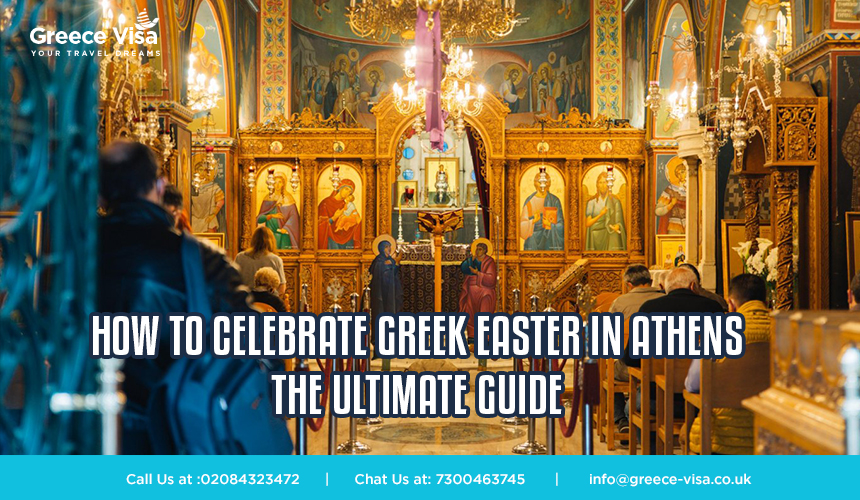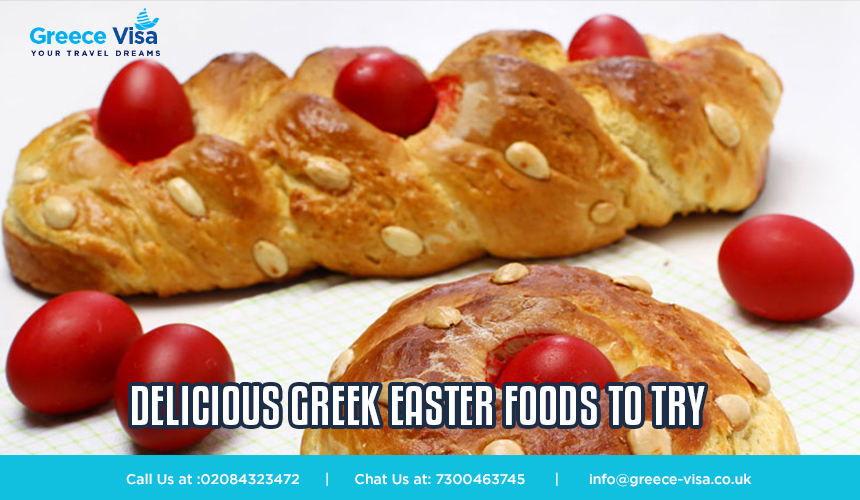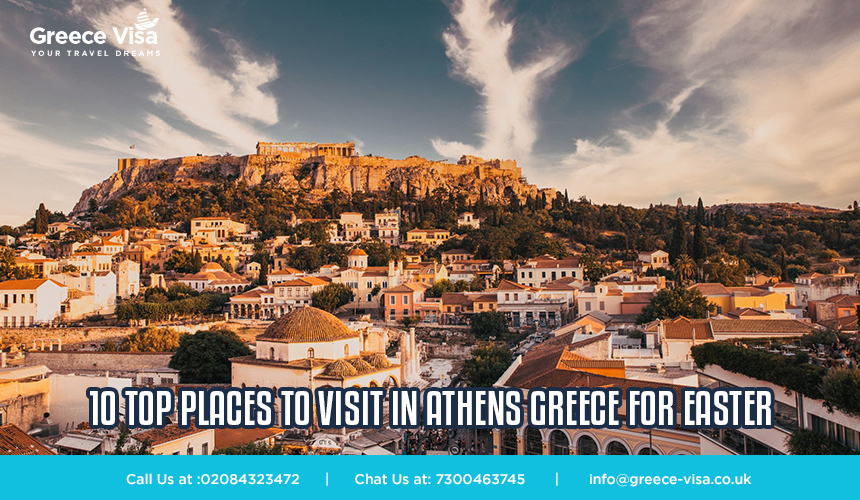
Easter in Greece is more than just a religious occasion – it’s a rich cultural celebration steeped in centuries-old traditions, feasting and festivities. The vibrant capital of Athens becomes the lively centre stage for many of these unique Greek Easter customs. With our Athens Easter Guide, you can enjoy incredible experiences in Greece. So, without any further ado, let’s get started!
Celebrating Easter in Athens allows you to participate in unique Greek cultural traditions that have been passed down through generations. The Greeks celebrate Easter with great passion and pageantry over an extended period, making it an incredible time to witness:
Instead of just observing, take part in the festivities to connect with the city’s vibrant community in a meaningful way. Easter is also a fantastic time to enjoy milder weather while avoiding the peak summer travel crowds in Athens.
Greek Easter festivities revolve around the communal feast of succulent, spit-roasted lamb or kid goat. As the meat-free Lenten fast ends, families gather to savour the juicy, herb-marinated meats cooked over open mangals (charcoal grills).
After midnight mass on Holy Saturday, Greeks partake in the lively “tsoungrisma” tradition of cracking dyed red eggs. Each person selects an egg representing new life and the Resurrection, rapidly tapping them together while exclaiming “Christós Anésti!” (Christ is Risen!). The holder of the last uncracked egg is considered the year’s lucky “Battler.”
From Palm Sunday until Holy Thursday, households engage in the ritual of boiling and colouring eggs a vivid crimson hue. These brilliant red eggs, symbolic of Christ’s blood and the Resurrection, play a central role in Easter in Greece customs.
The solemn yet joyous midnight mass on Holy Saturday marks the pivotal moment of Christ’s Resurrection and the end of Lent. As church bells peal at midnight, parish priests announce “Christós Anésti!” signalling the faithful to light candles and rejoice in the Paschal hymns.
On Holy Saturday morning, the “Holy Light” from the Church of the Holy Sepulchre in Jerusalem is transported to all Greek Orthodox churches. After the midnight service, believers parade home with their lit candles, representing Christ’s resurrection, while singing the renowned “Christós Anésti” hymns to bless their homes.
These Easter customs in Greece are a treat to watch and participate in. So, make sure to plan your holiday and visit Athens with your loved ones!

Sampling the vivid crimson-dyed hard-boiled eggs is an integral part of Easter in Greece. These eggs are ceremoniously cracked against each other by all present to reveal the lucky holder whose egg remains intact – a symbol of good luck and health for the coming year.
The star of the Greek Easter feast is the whole, succulent spit-roasted lamb marinated in a fragrant blend of olive oil, lemon, and herbs. Stuffed alternatively with rice, offal, and aromatic herbs, the lamb is slowly basted overnight on beachside mangals until meltingly tender.
In central Greece, spit-roasted kid goats, known as kontosouvli, are as popular as lambs. Flavoured with oregano, garlic, and wine vinegar, the skewered young goats are roasted over mangals until the meat is fall-off-the-bone delicious.
Greek Easter feasting wouldn’t be complete without freshly made cheeses like graviera, feta, kalathaki, and Cretan xynomyzithra. These tangy soft or semi-hard cheeses complement the roast meats and spring salads perfectly.
Greeks cherish their vitamin-rich horta or wild foraged greens during spring celebrations. Varieties like dandelions, mustard greens, and vlita accompany meat platters, salads, and bread dishes, symbolizing health and longevity.

Athens’ charming old quarter, Plaka, bustles with Easter festivities around Monastiraki Square.
Witness priests in ceremonial garbs, savour street food like red eggs and kokoretsi (lamb offal), or visit the iconic Byzantine churches to feel the Paschal fervour. The lively atmosphere, with locals celebrating in traditional dress and music filling the air, truly captures the spirit of Greek Easter.
Join locals feasting on spit-roasted lambs and kids in the many scenic Easter mangal spots dotting the slopes of Filopappou Hill.
The picturesque views overlooking the Acropolis, coupled with the smoky aromas, only enhance the celebrations. You can even bring your own supplies and set up a mangal to experience the age-old tradition firsthand.
Tucked under the Acropolis, the quaint Cycladic-style Anafiotika district holds authentic candle-lit Easter services and Greek folk dancing into the night, led by its neo-renaissance church.
The narrow, flower-adorned streets and whitewashed homes transport you to a quintessential Greek island village, making it a magical spot to soak in the Easter spirit.
Gorgeously decked up in blossoms, decorative eggs, and floral wreaths, the picture-perfect Adrianou street in the historic Plaka neighbourhood is the perfect Easter promenade amidst its chic cafes and shops.
Stroll along this pedestrian street, admiring the vibrant decorations and stopping for traditional treats like tsoureki (sweet bread) or melitinia (cheese pastries).
For a seaside ambience, head to the Easter festivities at coastal Glyfada beach. Families meet up here to spit-roast lambs by the sea and socialize over ouzo shots, commemorating Christ’s resurrection. Join the lively beach parties, or find a quieter spot to witness the sunset over the Aegean while savouring your Easter feast!
Greek families kick off Easter lunch by feasting on whole spit-roasted lamb or goat. These are often slow-cooked over a wood fire pit in the courtyard at classic tavernas like Paradosiako in Plaka or areas surrounding Monastiraki.
The iconic Byzantine cathedral on Metropoleos Square hosts the city’s main Easter services led by the Archbishop of Athens. Attend the moving Good Friday evening liturgy or the festive Resurrection Night Mass at midnight.
Wander the narrow alleys of Plaka lined with tables of revellers out celebrating on Easter Monday where you’ll find folk dance troupes in traditional costumes performing for diners.
Easily accessible day trips include the island of Aegina to experience more low-key village Easter festivities or ancient Delphi to view the famous Easter Pot Throwing custom.
Join the party at an Easter panigiri (festival) often held in neighbourhoods like Pangrati where you’ll find music, dancing, food stalls, games, and fun for all ages.

Experience the vibrant Greek Orthodox Easter in Athens like a local by planning ahead and following these tips:
Hotels in Athens usually sell out over the busy Easter period. Look for rentals in neighbourhoods like Plaka for an authentic Greek vibe.
Do this well in advance for Easter Sunday lunch, one of the biggest feasting days of the year for Greeks.
Witness the beautiful candlelit rituals and processions at night. Monasteries like Petraki in Athens are worth visiting for the midnight Resurrection services.
Go Easter egg hunting with young children in parks across Athens where you can take part in free, family-friendly events.
Check out the Monastiraki Flea Market to shop for hand-decorated red eggs, candles, leavened breads and other holiday foods.
Visit villages like Vari or Marathonas to experience the vibrant pot throwing or donkey racing traditions held in many towns.
Sample a full range of traditional Greek Easter dishes from local experts and family homes.
From centuries-steeped religious rites to dining on spit-roasted lamb for Easter Sunday lunch. Easter in Athens promises one of the most authentic, immersive cultural experiences in all of Greece. With colourful traditions overflowing across its neighbourhoods, Athens is the ultimate place for travellers to embrace the heart and soul of the Greek Easter. So, plan your Easter holiday in Greece and Apply for Greece visa today!
For Italy Blogs Visit: Italy Visa Appointment
You can experience spit-roasted lamb at the Easter mangal spots on Filopappou Hill, where locals feast on lambs and kids with picturesque views of the Acropolis.
The midnight mass on Holy Saturday is a solemn yet joyous occasion marking Christ’s Resurrection and the end of Lent. As church bells peal at midnight, parish priests announce “Christós Anésti!” and the faithful light candles and rejoice in the Paschal hymns.
Sampling the vivid crimson-dyed hard-boiled eggs is an integral part of Easter in Greece. Family members usually crack these eggs against each other to reveal the lucky one whose egg remains intact. The last person holding the uncracked egg symbolizes brining good luck and health for the coming year.
In Plaka, you can witness priests in ceremonial garbs, savor street food like red eggs and kokoretsi, visit Byzantine churches for Easter services, and enjoy the lively atmosphere with traditional dress and music.
The feast on succulent, spit-roasted lamb or kid goat marks the end of the meat-free Lenten fast. Families gather to savor the juicy, herb-marinated meats cooked over open mangals (charcoal grills), symbolizing communal celebration and the abundance of life.